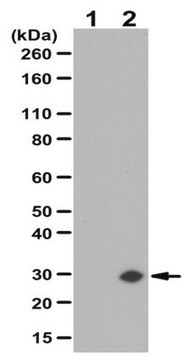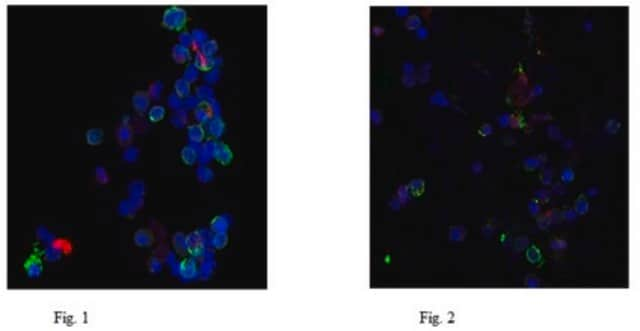SCT066
BioTracker Tau filaments pFTAA Live Cell Dye
Synonym(s):
Live cell imaging probe
Sign Into View Organizational & Contract Pricing
All Photos(1)
About This Item
UNSPSC Code:
12171501
NACRES:
NA.32
Recommended Products
technique(s)
cell based assay: suitable
General description
Protein misfolding diseases are characterized by deposition of protein aggregates. Accumulation of protein deposits, so-called amyloid, is the histopathological hallmark of several devastating diseases, and the development of sensitive optical ligands to detect and characterize these disease-associated structures is of great interest.
The BioTracker Tau filaments pFTAA live cell dye is a novel fluorescent probe that can bind to and discriminate between amyloid-b (A?) plaques and tau neurofibrillary tangles (NFTs) in Alzheimer′s disease (AD)-like pathology in transgenic mouse brain tissue sections.
Spectral Properties:
References:
Klingstedt T et al. The Structural Basis for Optimal Performance of Oligothiophene-Based Fluorescent Amyloid Ligands: Conformational Flexibility is Essential for Spectral Assignment of a Diversity of Protein Aggregates. Chem Eur J. 2013, 19, 10179-10192.
The BioTracker Tau filaments pFTAA live cell dye is a novel fluorescent probe that can bind to and discriminate between amyloid-b (A?) plaques and tau neurofibrillary tangles (NFTs) in Alzheimer′s disease (AD)-like pathology in transgenic mouse brain tissue sections.
Spectral Properties:
- Excitation: 405 nm
- Emissions: 550 nm
References:
Klingstedt T et al. The Structural Basis for Optimal Performance of Oligothiophene-Based Fluorescent Amyloid Ligands: Conformational Flexibility is Essential for Spectral Assignment of a Diversity of Protein Aggregates. Chem Eur J. 2013, 19, 10179-10192.
Application
Application: Live cell fluorescent imaging
Live cell imaging dye for detection of disease-associated protein aggregates such as Amyloid protein deposits.
Quality
Purity: ≥98% confirmed by HNMR, LC-MS and HPLC and elemental analysis
Molar Mass: 704.65 g/mol
Molar Mass: 704.65 g/mol
Other Notes
Unless otherwise stated in our catalog or other company documentation accompanying the product(s), our products are intended for research use only and are not to be used for any other purpose, which includes but is not limited to, unauthorized commercial
Storage Class Code
13 - Non Combustible Solids
WGK
WGK 1
Flash Point(F)
Not applicable
Flash Point(C)
Not applicable
Certificates of Analysis (COA)
Search for Certificates of Analysis (COA) by entering the products Lot/Batch Number. Lot and Batch Numbers can be found on a product’s label following the words ‘Lot’ or ‘Batch’.
Already Own This Product?
Find documentation for the products that you have recently purchased in the Document Library.
Our team of scientists has experience in all areas of research including Life Science, Material Science, Chemical Synthesis, Chromatography, Analytical and many others.
Contact Technical Service







